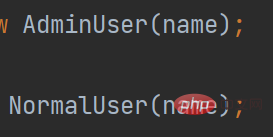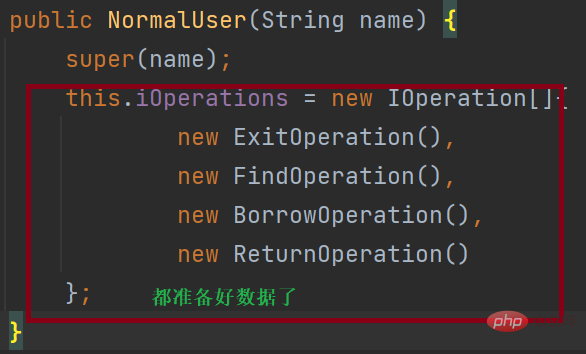 Java
Java
 javaTutorial
javaTutorial
 Detailed example of implementing a simple version of the library management system in Java
Detailed example of implementing a simple version of the library management system in Java
Detailed example of implementing a simple version of the library management system in Java
This article brings you relevant knowledge about java, which mainly organizes the related issues of implementing a simple version of the library management system, including analyzing the functions of the library management system, and in IDEA Let’s take a look at the creation of functional classes, user-related processing, etc. I hope it will be helpful to everyone.

Recommended study: "java video tutorial"
1. Analyze the functions of the library management system
us Let’s first analyze the functions that a library management system should have and build a simple framework.
(1) Login
Normally, only two types of people can use the library management system, one is the student and the other is the librarian
This is the login interface of my school’s online library. Students can search for books through the Internet.

But I can’t see the administrator’s login interface here. But there will definitely be a window for the backend administrator to log in for system maintenance
So depending on the user, you have to choose whether you are an ordinary user or an administrator when logging in.
(2) Analysis function
The functions that a simple library management system should have,
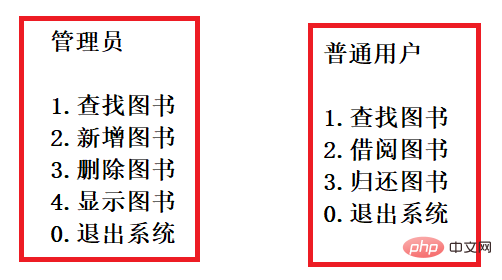
2. Create functional classes in IDEA
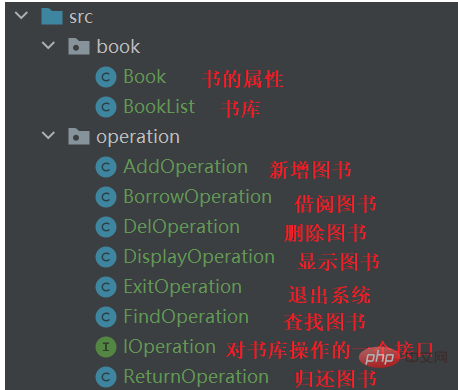
2.1 Create a package named book, which stores book-related information
( 1) Create a Book class to display the attributes of the book
To search for a book, a book should have these attributes

private String name;//书名 private String author;//作者 private int price;//价格 private String type;//类型 private boolean isBorrowed;//借阅情况
Note that the control characters provided for the book here are private and cannot be accessed outside the class
So we need to provide get() and set() to set and obtain the properties
public String getName() {
return name;
}
public void setName(String name) {
this.name = name;
}
public String getAuthor() {
return author;
}
public void setAuthor(String author) {
this.author = author;
}
public int getPrice() {
return price;
}
public void setPrice(int price) {
this.price = price;
}
public String getType() {
return type;
}
public void setType(String type) {
this.type = type;
}
public boolean isBorrowed() {
return isBorrowed;
}
public void setBorrowed(boolean borrowed) {
isBorrowed = borrowed;
}Provide a construction method for the book's attributes.
Note here that isBorrowed is not added to the book in the construction method. isBorrowed is of boolean type and defaults to false. It just hasn’t been lent out. If you condition a book, it will default to not being lent out
public Book(String name, String author, int price, String type) {
this.name = name;
this.author = author;
this.price = price;
this.type = type;
}Finally, provide a toString method to display the book information
@Override
public String toString() {
return "BookList{" +
"name='" + name + '\'' +
", author='" + author + '\'' +
", price=" + price +
", type='" + type + '\'' +
", isBorrowed=" + isBorrowed +
'}';
}(2) Create a BookList class, this is the book library
Because it is a book library and it needs to store books, so set up an array to store the books
//最多存放20本书 private Book[] books = new Book[20];
And provide a member variable, To record the number of books in the current books array in real time
private int usedSize;//实时记录 当前Books这个数组中有多少本书
The following can provide a construction method to store a few books in it
public BookList() {
books[0] = new Book("西游记","吴承恩",25,"小说");
books[1] = new Book("红楼梦","曹雪芹",26,"小说");
books[2] = new Book("三国演义","罗贯中",27,"小说");
books[3] = new Book("水浒传","施耐庵",28,"小说");
usedSize = 4;//当前有4本书
}Provide a method, if a legal Array subscript, you can find this book
public Book getBook(int pos) {
return books[pos];
}Provide a method, give a legal array subscript, and a book, you can store the book in the library
public void setBooks(int pos,Book book) {
books[pos] = book;
}Provide a method and a parameter to modify the number of books on the current bookshelf in real time
public void setUsedSize(int size) {
usedSize = size;
}2.2 Create a package named Operation, which stores all operations on books
(1) Create an IOperation interface to implement the operation reference of the array
Because whether it is an administrator or an ordinary user, the operations on books are performed in the array books of the BookList class ,
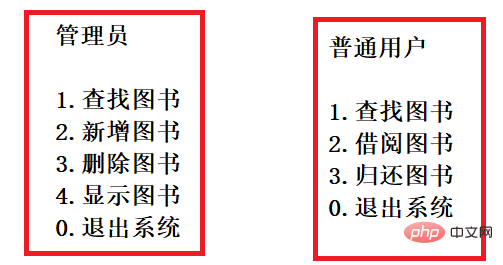
Therefore, an IOperation interface can be provided to implement the operation of the array,
public interface IOperation {
/*
* 对书的所有操作都是通过BookList类里面的books数组进行操作
* 可以将这个写成一个接口
**/
void work(BookList bookList);
}(2) Create various classes to implement All operations on books
For example, ordinary users and administrators have to perform display operations on books. This display is an effect,
So you only need to write a class, ordinary Both users and administrators can call it.
Together, just create these classes,
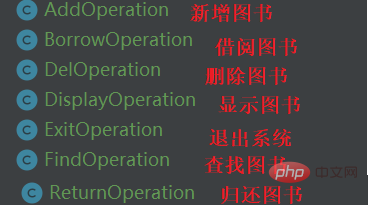
然后就可以对这些类引用接口了,再重写一下
比如新增图书
public class AddOperation implements IOperation {
@Override
public void work(BookList bookList) {
System.out.println("新增图书!");
}
}3.进行用户相关的处理
也就是对普通用户和管理员进行处理
(1)创建一个user的包,在包中创建一个类

这里只创建一个类,是因为对于普通用户和管理员来说,他们两个都是用户
所以创建一个成员变量,来表示用户
//写protected是后面要继承 protected String name;//用户名
下面提供一个构造方法对其初始化
//提供一个构造方法,用来初始化当前对象name属性
public User(String name) {
this.name = name;
}(2)在user包中再创建两个类

子类NormalUser继承父类User,提供一个构造方法来显示帮助父类进行构造
public class NormalUser extends User{
public NormalUser(String name) {
super(name);
}
}子类AdminUser继承父类User和前面一样
下来就是打印菜单了,根据两个用户所需功能进行打印菜单
先看AdminUser管理员的
public int menu() {
System.out.println("hello " + this.name + "欢迎进入图书管理系统!");
System.out.println("1.查找图书!");
System.out.println("2.新增图书!");
System.out.println("3.删除图书!");
System.out.println("4.显示图书!");
System.out.println("0.退出系统!");
System.out.println("请输入你的操作:");
Scanner scanner = new Scanner(System.in);
int choice = scanner.nextInt();
return choice;
//因为这个是个菜单,所以要把这个输入的值传出去,才能使用
}再看NormalUser普通用户的
System.out.println("hello " + this.name + "欢迎进入图书管理系统!");
System.out.println("1.查找图书!");
System.out.println("2.借阅图书!");
System.out.println("3.归还图书!");
System.out.println("0.退出系统!");
System.out.println("请输入你的操作:");
Scanner scanner = new Scanner(System.in);
int choice = scanner.nextInt();
return choice;
//因为这个是个菜单,所以要把这个输入的值传出去,才能使用(3)单独创建一个Main的类,将前面所有整合起来
菜单用户都有了,下面就是要把这些都整合起来,
先准备图书
BookList bookList = new BookList();//准备图书
结下来就是登录了,
先写一个判断你是普通用户还是管理员的方法
public static User login() {
System.out.println("请输入你的姓名:");
Scanner scanner = new Scanner(System.in);
String name = scanner.nextLine();
System.out.println("请输入你的身份:1:-》管理员.0:-》普通用户");
int choice = scanner.nextInt();
if (choice == 1) {
return new AdminUser(name);
}else {
return new NormalUser(name);
}
}注意观察这段代码,返回类型是User,这是因为不论if中返回是AdminUser还是NormalUser,User作为父类都可以接收,这个过程就发生了向上转型
然后再在main方法中引用这个login()方法,就可以实现选择登录了
//登录-》user这个引用 引用哪个对象看前面if User user = login();
选择完你是哪种用户后,就打印对应功能菜单
但是注意,刚刚把菜单写在了对应子类中去了
如果现在要在父类中访问,是访问不了的,所以就要在父类中也引用出菜单
public abstract class User {
//写protected是后面要继承
protected String name;//用户名
//提供一个构造方法,用来初始化当前对象name属性
public User(String name) {
this.name = name;
}
public abstract int menu();
}看代码中,只需将父类写成抽象类,然后在抽象类中,引出抽象方法的菜单,
就可以在Main类中通过父类访问到菜单,这就实现了动态绑定
public static void main(String[] args) {
//开始整合
BookList bookList = new BookList();//准备图书
//登录-》user这个引用 引用哪个对象看前面if
User user = login();
user.menu();//动态绑定
//要想访问子类中的菜单,那就要将父类写成抽象类,
//然后子类重写父类的方法,才可以访问菜单
}
}然后此时代码就可以运行了
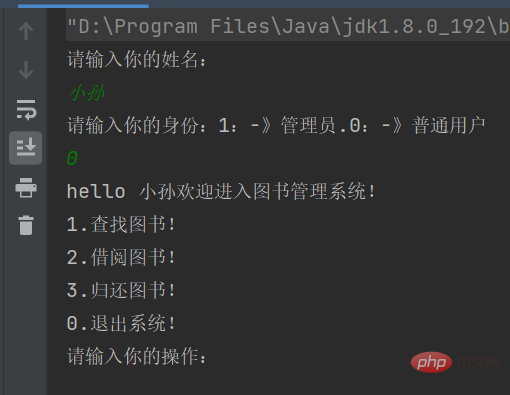
4.开始实现对书所有具体的操作功能
4.1先实现可以调用具体操作的功能方法
先在User中写一个方法,这个方法的作用是
通过某个用户,访问这个用户对应方法功能的数组下标,然后通过调用work方法,来实现功能
public void doOperation(int choice, BookList bookList) {
this.iOperations[choice].work(bookList);
}然后在mian中,通过选择用户引用这个方法
public static void main(String[] args) {
//开始整合
BookList bookList = new BookList();//准备图书
//登录-》user这个引用 引用哪个对象看前面if
User user = login();
int choice = user.menu();//动态绑定
user.doOperation(choice,bookList);
}细节可以看这个图片
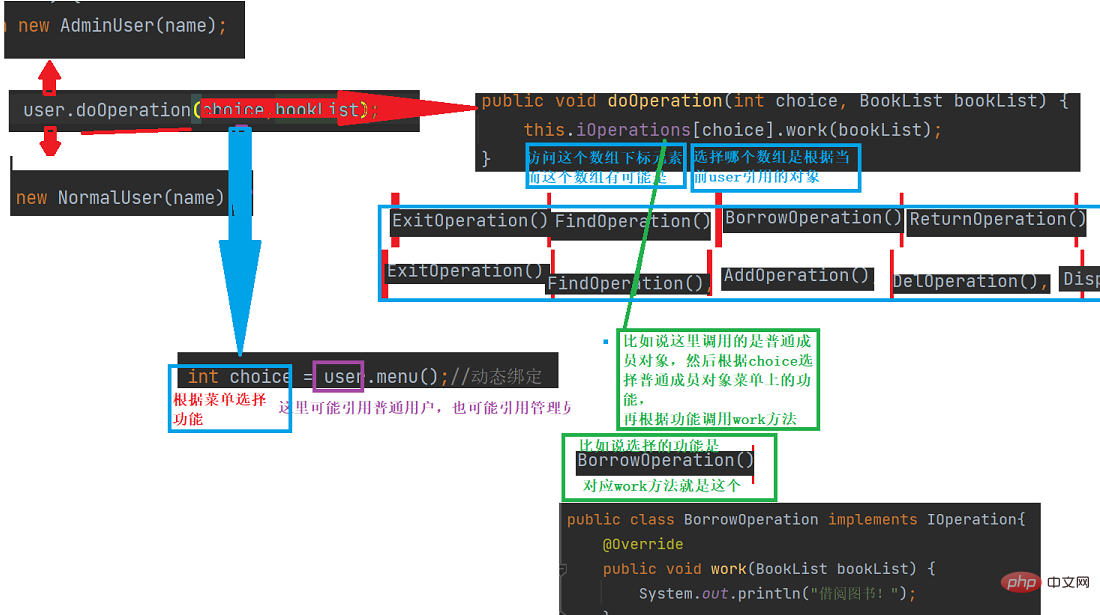
下面来看一下具体细节分析
(1)mian函数先调用
(2)现在user引用,有可能是两个对象
(3)
当引用doOperation时,根据菜单选择来访问数组元素
(4)具体选择哪个用户根据,前面login()中输入的选择对象

(5)根据前面选择需要的功能,调用work方法
比如这个
4.2 测试一下
现在已经整合完成了,就差具体操作功能实现了,先运行代码试试
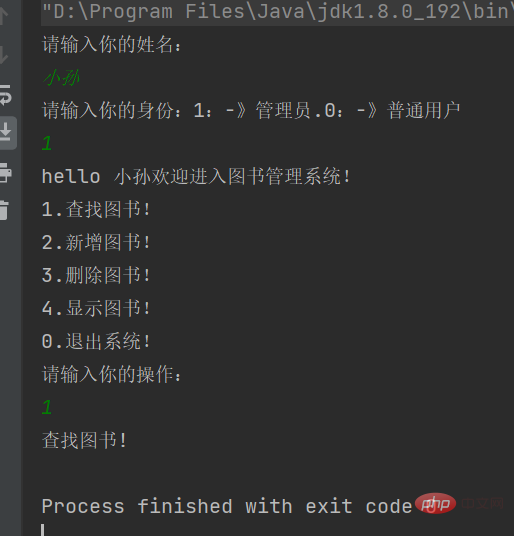
代码成功运行起来了,但是就用了一个功能就结束了,
所以我们可以加一个循环,来使用多个功能
public static void main(String[] args) {
//开始整合
BookList bookList = new BookList();//准备图书
//登录-》user这个引用 引用哪个对象看前面if
User user = login();
while(true){
int choice = user.menu();//动态绑定
user.doOperation(choice,bookList);
}
}4.3 实现单独具体的操作的功能
(1)新增图书 AppOperation类
新增一本图书我们需要考虑输入这些

不用考虑isBorrowed 因为默认状态是未被借出的
将这些属性进行输入
Scanner scanner = new Scanner(System.in);
System.out.println("请输入图书的名字:");
String name = scanner.nextLine();
System.out.println("请输入图书的作者:");
String author = scanner.nextLine();
System.out.println("请输入图书的价格:");
int price = scanner.nextInt();
System.out.println("请输入图书的类型:");
String type = scanner.nextLine();然后将这些属性存放到new Book中
Book book = new Book(name,author,price,type);
获取当前下标,然后赋给currentSize,将前面输入的那本书放到数组下标为currentSize中,
然后给 currentSize加1
int currentSize = bookList.getUsedSize(); bookList.setBooks(currentSize,book); bookList.getUsedSize(currentSize+1);
运行一下,试试看
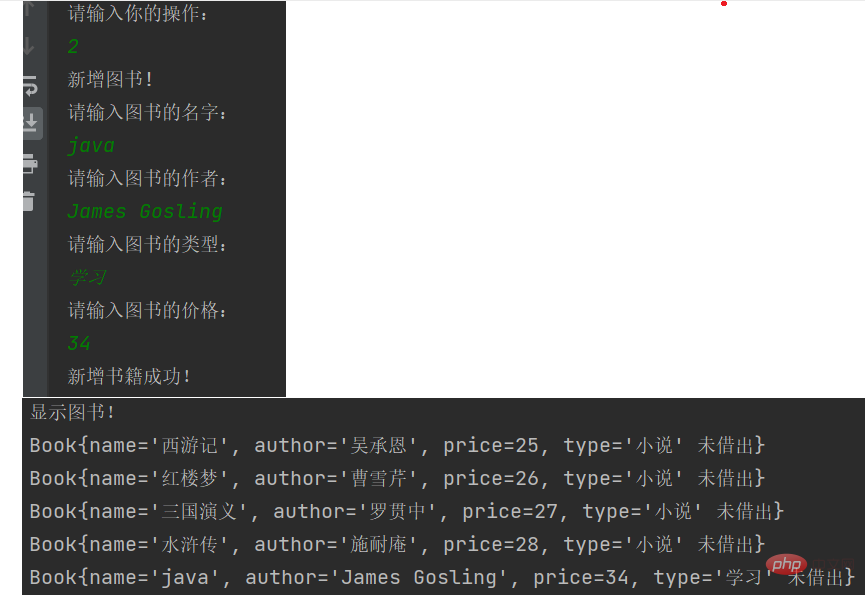
新增图书 AppOperation类的所有代码
public class AddOperation implements IOperation {
@Override
public void work(BookList bookList) {
System.out.println("新增图书!");
Scanner scanner = new Scanner(System.in);
System.out.println("请输入图书的名字:");
String name = scanner.nextLine();
System.out.println("请输入图书的作者:");
String author = scanner.nextLine();
System.out.println("请输入图书的类型:");
String type = scanner.nextLine();
System.out.println("请输入图书的价格:");
int price = scanner.nextInt();
Book book = new Book(name,author,price,type);
int currentSize = bookList.getUsedSize();
bookList.setBooks(currentSize,book);
bookList.getUsedSize(currentSize+1);
System.out.println("新增书籍成功!");
}
}(2)借阅图书 orrowOperation类
先输入要借阅图书的名字
Scanner scanner = new Scanner(System.in);
System.out.println("请输入借阅图书的名字:");
String name = scanner.nextLine();通过for循环遍历一遍,然后将遍历的每一本书赋给变量 book ,
再通过equals,来判断book和输入的书的名字是否相同,
如果相同就通过setBorrowed修改此时借阅状态,显示借阅成功
如果不同就显示没有这本书
int currentSize = bookList.getUsedSize();
for (int i = 0; i < currentSize; i++) {
Book book = bookList.getBook(i);
if(book.getName().equals(name)){
book.setBorrowed(true);
System.out.println("借阅成功!");
return;
}
}
System.out.println("没有这本书!");运行一下,试试看
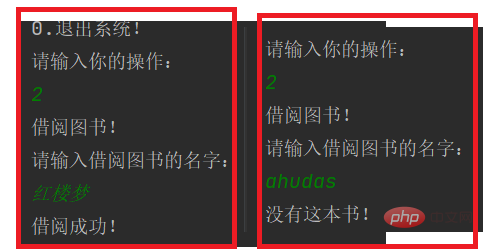
借阅图书 orrowOperation类的所有代码
public class BorrowOperation implements IOperation{
@Override
public void work(BookList bookList) {
System.out.println("借阅图书!");
Scanner scanner = new Scanner(System.in);
System.out.println("请输入借阅图书的名字:");
String name = scanner.nextLine();
int currentSize = bookList.getUsedSize();
for (int i = 0; i < currentSize; i++) {
Book book = bookList.getBook(i);
if(book.getName().equals(name)){
book.setBorrowed(true);
System.out.println("借阅成功!");
return;
}
}
System.out.println("没有这本书!");
}
}(3)删除图书 DelOperation类
输入删除图书的名字
Scanner scanner = new Scanner(System.in);
System.out.println("请输入删除图书的名字:");
String name = scanner.nextLine();找到图书,然后删除
int currentSize = bookList.getUsedSize();
for (int i = 0; i < currentSize; i++) {
Book book = bookList.getBook(i);
if(book.getName().equals(name)){
for (int j = i; j < currentSize; j++) {
bookList.getBook(j);
}
bookList.getUsedSize(currentSize-1);//不要忘记更新图书种类
bookList.getUsedSize(currentSize-1);
System.out.println("删除成功!");
return;
}
}
System.out.println("没有找到要删除的图书!");运行程序,试试看
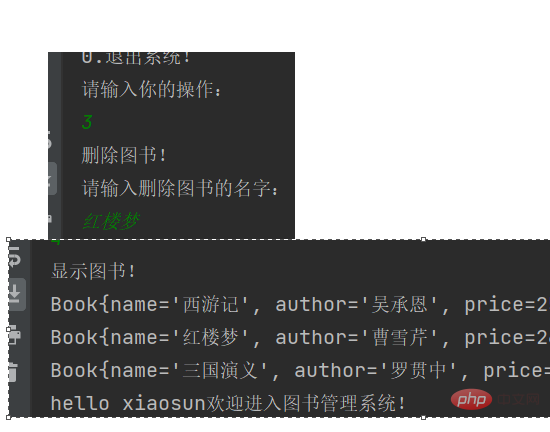
删除图书 DelOperation类的全部代码
public class DelOperation implements IOperation{
@Override
public void work(BookList bookList) {
System.out.println("删除图书!");
Scanner scanner = new Scanner(System.in);
System.out.println("请输入删除图书的名字:");
String name = scanner.nextLine();
int currentSize = bookList.getUsedSize();
for (int i = 0; i < currentSize; i++) {
Book book = bookList.getBook(i);
if(book.getName().equals(name)){
for (int j = i; j < currentSize; j++) {
bookList.getBook(j);
}
bookList.getUsedSize(currentSize-1);//不要忘记更新图书种类
bookList.getUsedSize(currentSize-1);
System.out.println("删除成功!");
return;
}
}
System.out.println("没有找到要删除的图书!");
}
}(4)显示图书 DisplayOperation类
将当前有几本书记录下来
int currentSize = bookList.getUsedSize();
然后for循环全部遍历一遍就可以了 ,直接看代码吧
public class DisplayOperation implements IOperation{
@Override
public void work(BookList bookList) {
System.out.println("显示图书!");
int currentSize = bookList.getUsedSize();
for (int i = 0; i < currentSize; i++) {
System.out.println(bookList.getBook(i));
}
}
}运行结果就是这样
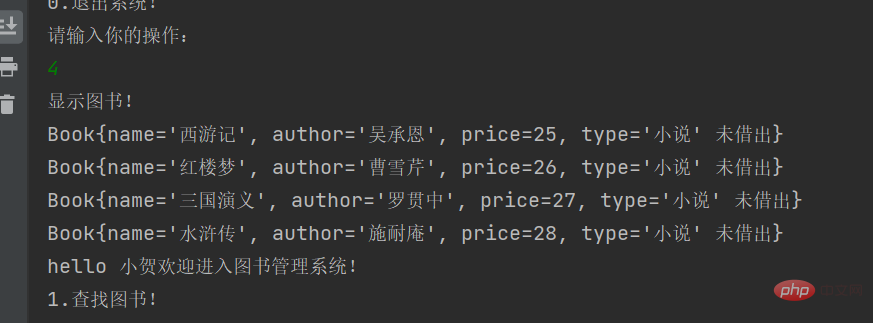
(5)退出系统 ExitOperation类
直接调用状态码exit来退出系统
public class ExitOperation implements IOperation{
@Override
public void work(BookList bookList) {
System.out.println("退出系统!");
System.exit(0);
}
}
(6)查找图书 FindOperation类
要查找图书,肯定是先要输入你需要查找书的名字
Scanner scanner = new Scanner(System.in);
System.out.println("请输入图书的名字:");
String name = scanner.nextLine();通过for循环遍历一遍,然后将遍历的每一本书赋给变量 book ,
再通过equals,来判断book和输入的书的名字是否相同,
如果相同就打印,并显示找到了,如果不相同,就直接显示没有找到,
但这里有一个问题在前面给每一本书默认都是false,现在打印还是这样,所以要修改一下
在Book类中,修改toString,给借阅状态一个三目运算符,来判断是否借出了
@Override
public String toString() {
return "Book{" +
"name='" + name + '\'' +
", author='" + author + '\'' +
", price=" + price +
", type='" + type + '\'' +
((isBorrowed == true)?" 已经借出":" 未借出")+
'}';
}运行一下,试试
 查找图书 FindOperation类的全部代码就是
查找图书 FindOperation类的全部代码就是
public class FindOperation implements IOperation{
@Override
public void work(BookList bookList) {
System.out.println("查找图书!");
Scanner scanner = new Scanner(System.in);
System.out.println("请输入图书的名字:");
String name = scanner.nextLine();
int currentSize = bookList.getUsedSize();
for (int i = 0; i < currentSize; i++) {
Book book = bookList.getBook(i);
if(book.getName().equals(name)){
System.out.println("这本书找到了!");
System.out.println(book);
return;
}
}
System.out.println("这本书没有找到!");
}
}(7)归还图书 ReturnOperation类
先输入要归还图书的名字
Scanner scanner = new Scanner(System.in);
System.out.println("请输入归还图书的名字:");
String name = scanner.nextLine();和前面借阅基本一样,修改一下setBorrowed的状态就可以了
int currentSize = bookList.getUsedSize();
for (int i = 0; i < currentSize; i++) {
Book book = bookList.getBook(i);
if(book.getName().equals(name)){
book.setBorrowed(false);
System.out.println("归还成功!");
return;
}
}运行代码,试试看
<br>
归还图书 ReturnOperation类的全部代码
public class ReturnOperation implements IOperation{
@Override
public void work(BookList bookList) {
System.out.println("归还图书!");
Scanner scanner = new Scanner(System.in);
System.out.println("请输入归还图书的名字:");
String name = scanner.nextLine();
int currentSize = bookList.getUsedSize();
for (int i = 0; i < currentSize; i++) {
Book book = bookList.getBook(i);
if(book.getName().equals(name)){
book.setBorrowed(false);
System.out.println("归还成功!");
return;
}
}
}
}推荐学习:《java视频教程》
The above is the detailed content of Detailed example of implementing a simple version of the library management system in Java. For more information, please follow other related articles on the PHP Chinese website!

Hot AI Tools

Undresser.AI Undress
AI-powered app for creating realistic nude photos

AI Clothes Remover
Online AI tool for removing clothes from photos.

Undress AI Tool
Undress images for free

Clothoff.io
AI clothes remover

Video Face Swap
Swap faces in any video effortlessly with our completely free AI face swap tool!

Hot Article

Hot Tools

Notepad++7.3.1
Easy-to-use and free code editor

SublimeText3 Chinese version
Chinese version, very easy to use

Zend Studio 13.0.1
Powerful PHP integrated development environment

Dreamweaver CS6
Visual web development tools

SublimeText3 Mac version
God-level code editing software (SublimeText3)

Hot Topics
 1389
1389
 52
52
 Perfect Number in Java
Aug 30, 2024 pm 04:28 PM
Perfect Number in Java
Aug 30, 2024 pm 04:28 PM
Guide to Perfect Number in Java. Here we discuss the Definition, How to check Perfect number in Java?, examples with code implementation.
 Weka in Java
Aug 30, 2024 pm 04:28 PM
Weka in Java
Aug 30, 2024 pm 04:28 PM
Guide to Weka in Java. Here we discuss the Introduction, how to use weka java, the type of platform, and advantages with examples.
 Smith Number in Java
Aug 30, 2024 pm 04:28 PM
Smith Number in Java
Aug 30, 2024 pm 04:28 PM
Guide to Smith Number in Java. Here we discuss the Definition, How to check smith number in Java? example with code implementation.
 Java Spring Interview Questions
Aug 30, 2024 pm 04:29 PM
Java Spring Interview Questions
Aug 30, 2024 pm 04:29 PM
In this article, we have kept the most asked Java Spring Interview Questions with their detailed answers. So that you can crack the interview.
 Break or return from Java 8 stream forEach?
Feb 07, 2025 pm 12:09 PM
Break or return from Java 8 stream forEach?
Feb 07, 2025 pm 12:09 PM
Java 8 introduces the Stream API, providing a powerful and expressive way to process data collections. However, a common question when using Stream is: How to break or return from a forEach operation? Traditional loops allow for early interruption or return, but Stream's forEach method does not directly support this method. This article will explain the reasons and explore alternative methods for implementing premature termination in Stream processing systems. Further reading: Java Stream API improvements Understand Stream forEach The forEach method is a terminal operation that performs one operation on each element in the Stream. Its design intention is
 TimeStamp to Date in Java
Aug 30, 2024 pm 04:28 PM
TimeStamp to Date in Java
Aug 30, 2024 pm 04:28 PM
Guide to TimeStamp to Date in Java. Here we also discuss the introduction and how to convert timestamp to date in java along with examples.
 Java Program to Find the Volume of Capsule
Feb 07, 2025 am 11:37 AM
Java Program to Find the Volume of Capsule
Feb 07, 2025 am 11:37 AM
Capsules are three-dimensional geometric figures, composed of a cylinder and a hemisphere at both ends. The volume of the capsule can be calculated by adding the volume of the cylinder and the volume of the hemisphere at both ends. This tutorial will discuss how to calculate the volume of a given capsule in Java using different methods. Capsule volume formula The formula for capsule volume is as follows: Capsule volume = Cylindrical volume Volume Two hemisphere volume in, r: The radius of the hemisphere. h: The height of the cylinder (excluding the hemisphere). Example 1 enter Radius = 5 units Height = 10 units Output Volume = 1570.8 cubic units explain Calculate volume using formula: Volume = π × r2 × h (4
 Create the Future: Java Programming for Absolute Beginners
Oct 13, 2024 pm 01:32 PM
Create the Future: Java Programming for Absolute Beginners
Oct 13, 2024 pm 01:32 PM
Java is a popular programming language that can be learned by both beginners and experienced developers. This tutorial starts with basic concepts and progresses through advanced topics. After installing the Java Development Kit, you can practice programming by creating a simple "Hello, World!" program. After you understand the code, use the command prompt to compile and run the program, and "Hello, World!" will be output on the console. Learning Java starts your programming journey, and as your mastery deepens, you can create more complex applications.




